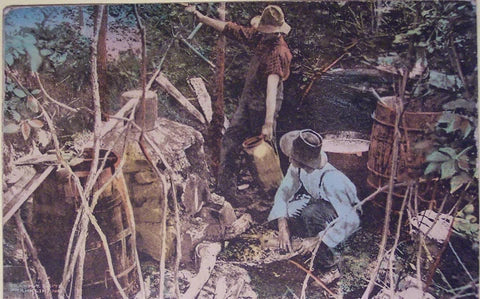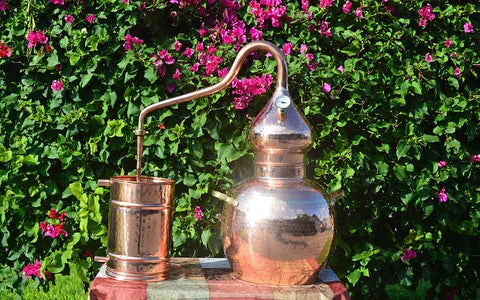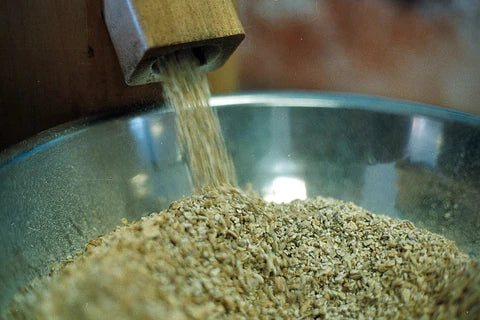Historically, people have distilled grappas, spirits, water, and essential oils in their homes for centuries. The copper stills we have come to know as “whiskey stills” or “moonshine stills” are old designs that have been in use around the world for a long time. It wasn’t really until the late 19th century that they developed their nickname and reputation.
There are many legends, myths, and downright lies about owning a whiskey still, using a still to make non-alcohol products, and distilling moonshine or other alcohols at home. Know your facts about distilling laws, and don’t settle for lies.
US Federal Moonshine Still Laws
Still ownership law is overseen by a department in the US Treasury - the Alcohol and Tobacco Trade and Tax Bureau. US Federal law states that it is legal for anyone to own a still or distilling equipment if it is used for “legal purposes.” This means that if you are a collector or are interested in having a whiskey still as a decoration, you do not need to apply for any federal licenses or register your still. You may simply continue to use it for legal purposes.
Federal law also sees the distillation of non-alcoholic products as a “legal purpose.” If you are using your still to distill water or essential oils, you also do not need to apply for any federal permit or register the still.
Copper stills are often also used in chemistry laboratories, and for various scientific experiments and procedures. If you own and use a “moonshine still” (any design of distilling equipment) for these purposes, you do not need to register or license your still.
Still Ownership Myth #1:
One of the most common misconceptions is that federal law says that people can’t own stills larger than 1 gallon. But, federal law clearly states that a person can own any size still for a legal purpose.
Still Ownership Myth #2:
Another myth is that if you own a whiskey or moonshine still, you are not allowed to keep it in your home, and must keep it outside or in a special building (like a shed or barn) - even if you never operate the still.
This is also false. Federal distilling law does not place regulations on how you must keep or care for a still that is being used for legal purposes like decoration, collection, or safe distilling of water and botanical oils.
US Federal Moonshine Distilling Law

Own whatever size still you like and get permits for any alcohol distilling
Now, owning a moonshine or whiskey still to use for “legal purposes” like decoration and distilling water may not require a permit or licensing, but if you plan to distill, distribute, consume, and sell any alcoholic product from your copper still, you want to have the proper permits beforehand.
There are 2 types of federal distillation permits:
The Federal Fuel Alcohol Permit
With so many ethanol-fuel-powered machines on the market today, some people have chosen to produce their own alcohol-based fuel at home. To do so, apply for the Federal Fuel Alcohol Permit, which is inexpensive and easy to obtain. Moonshine still owners with this permit cannot distill “consumable” alcohol - only alcohol-based fuel.
The Federal Distilled Spirits Permit
One of the most obvious, and popular, reasons for owning a moonshine or whiskey still is to distill some type of alcohol - be it bourbon, vodka, whiskey, grappas, or moonshine.
If you want to distill spirits at home to consume yourself or share with others, you must first apply for a Federal Distilled Spirits Permit. The permit requires a hefty fee, in addition to regulated inspections of your distillation equipment and facility.
If you want to bottle, sell, and market your spirits, you should make sure to read all the preparations you need to consider about your consumer product. Check out the TTB’s helpful guide to Getting Started in the Distilled Spirits Industry.
State Laws About Still Ownership
Each state has its own legislation about at-home distillation. Some states (like Missouri) allow citizens over age 21 to distill alcohol at home without any permits or licenses at all, and other states (like Florida) do not even allow citizens to own distilling equipment unless they have obtained the proper state permit.
Federal law takes precedence and overrides any state law that does not agree with it.
For example, Missouri citizens still need to obtain a federal permit in order to distill spirits, but they do not need to obtain additional permits from the state. On the other hand, a Florida citizen who wants to own a still for decoration (but not to distill any alcohol) does not need to obtain a federal permit, but would need to obtain the proper license from the state of Florida.
State laws about owning and using distillation equipment are available on the website for your state’s government. Begin your search with this list of State-by-State Distilling Laws from the Hobby Distiller’s Association. You can also use USA.gov to search for the current information on your state's website.
Local Laws about Distilling at Home
Once you are sure that you have the proper license at the federal level, and you confirm that you are in compliance with your state laws about at-home distilling, you want to also check with your county and city statutes. You never know until you look if your specific county, parish, city, or township may have local certifications, licenses, or permits that are needed to operate your moonshine still at home.
USA.gov can also be used to quickly find information from your local government websites.
Enjoy Legal Alcohol

1920s cops were always on the lookout for illegal moonshiners
The truth about distilling and the law is: It’s easy to stay within the lines of the law when you know what they are. The first step in beginning your alcohol production at home is to do your research about the law and the consequences of breaking it.
Your moonshine still can be enjoyed for a number of things, and should always be enjoyed responsibly.
Article by: Jim Thomas
Photo credit:
"The Moonshiners in the Mountains of NC" by Dave
"Tennessee" by WSP
"Precinct No 5" by Seattle Municipal Archives



